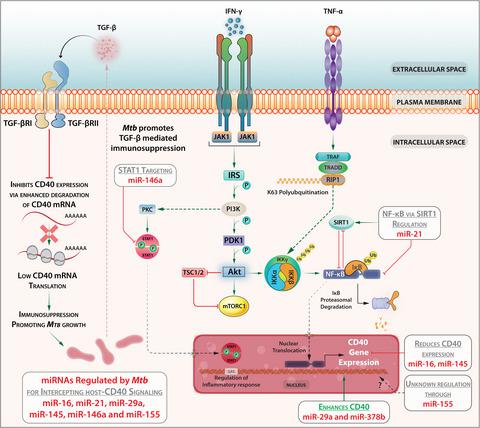当前位置:
X-MOL 学术
›
Clin. Transl. Immunol.
›
论文详情
Our official English website, www.x-mol.net, welcomes your
feedback! (Note: you will need to create a separate account there.)
March of Mycobacterium: miRNAs intercept host cell CD40 signalling
Clinical & Translational Immunology ( IF 4.6 ) Pub Date : 2020-10-07 , DOI: 10.1002/cti2.1179 Prashant Chauhan 1 , Jagneshwar Dandapat 2 , Arup Sarkar 3 , Bhaskar Saha 1, 3
Clinical & Translational Immunology ( IF 4.6 ) Pub Date : 2020-10-07 , DOI: 10.1002/cti2.1179 Prashant Chauhan 1 , Jagneshwar Dandapat 2 , Arup Sarkar 3 , Bhaskar Saha 1, 3
Affiliation

|
The disease tuberculosis is fatal if untreated. It is caused by the acid‐fast bacilli Mycobacterium tuberculosis. Mycobacterium resides and replicates within the alveolar macrophages, causing inflammation and granuloma, wherein macrophage‐T cell interactions enhance the inflammation‐causing pulmonary caseous lesions. The first interactions between Mycobacterium and the receptors on macrophages decide the fate of Mycobacterium because of phagolysosomal impairments and the expression of several miRNAs, which may regulate CD40 expression on macrophages. While the altered phagolysosomal functions impede antigen presentation to the T cell‐expressed antigen receptor, the interactions between the macrophage‐expressed CD40 and the T cell‐expressed CD40‐ligand (CD40L or CD154) provide signals to T cells and Mycobacterium‐infected macrophages. These two functions significantly influence the resolution or persistence of Mycobacterium infection. CD40 controls T‐cell polarisation and host‐protective immunity by eliciting interleukin‐12p40, nitric oxide, reactive oxygen species and IFN‐γ production. Indeed, CD40‐deficient mice succumb to low‐dose aerosol infection with Mycobacterium because of deficient interleukin (IL)‐12 production leading to impaired IFN‐γ‐secreting T‐cell response. In contrast, despite generating fewer granulomas, the CD40L‐deficient mice developed anti‐mycobacterial T‐cell responses to the levels observed in the wild‐type mice. These host‐protective responses are significantly subdued by the Mycobacterium‐infected macrophage produced TGF‐β and IL‐10, which promote pro‐mycobacterial T‐cell responses. The CD40‐CD40L‐induced counteractive immune responses against Mycobacterium thus present a conundrum that we explain here with a reconciliatory hypothesis. Experimental validation of the hypothesis will provide a rationale for designing anti‐tubercular immunotherapy.
中文翻译:

分枝杆菌的进军:miRNA 拦截宿主细胞 CD40 信号传导
如果不治疗的话,结核病是致命的。它是由抗酸杆菌结核分枝杆菌引起的。分枝杆菌在肺泡巨噬细胞内驻留和复制,引起炎症和肉芽肿,其中巨噬细胞-T细胞相互作用增强了引起炎症的肺部干酪样病变。由于吞噬溶酶体损伤和多种 miRNA 的表达(可能调节巨噬细胞上的 CD40 表达),分枝杆菌与巨噬细胞上的受体之间的首次相互作用决定了分枝杆菌的命运。虽然改变的吞噬溶酶体功能阻碍了抗原呈递给 T 细胞表达的抗原受体,但巨噬细胞表达的 CD40 和 T 细胞表达的 CD40 配体(CD40L 或 CD154)之间的相互作用向 T 细胞和分枝杆菌感染的巨噬细胞提供信号。这两个功能显着影响分枝杆菌感染的消除或持续性。 CD40 通过引发白介素-12p40、一氧化氮、活性氧和 IFN-γ 的产生来控制 T 细胞极化和宿主保护性免疫。事实上,CD40 缺陷小鼠会死于分枝杆菌低剂量气溶胶感染,因为白介素 (IL)-12 生成不足,导致 IFN-γ 分泌 T 细胞反应受损。相比之下,尽管产生的肉芽肿较少,但 CD40L 缺陷小鼠产生的抗分枝杆菌 T 细胞反应与野生型小鼠中观察到的水平相同。这些宿主保护反应被分枝杆菌感染的巨噬细胞产生的 TGF-β 和 IL-10 显着抑制,从而促进前分枝杆菌 T 细胞反应。 因此,CD40-CD40L 诱导的针对分枝杆菌的反向免疫反应提出了一个难题,我们在此用调和假设进行解释。该假设的实验验证将为设计抗结核免疫疗法提供依据。
更新日期:2020-10-08
中文翻译:

分枝杆菌的进军:miRNA 拦截宿主细胞 CD40 信号传导
如果不治疗的话,结核病是致命的。它是由抗酸杆菌结核分枝杆菌引起的。分枝杆菌在肺泡巨噬细胞内驻留和复制,引起炎症和肉芽肿,其中巨噬细胞-T细胞相互作用增强了引起炎症的肺部干酪样病变。由于吞噬溶酶体损伤和多种 miRNA 的表达(可能调节巨噬细胞上的 CD40 表达),分枝杆菌与巨噬细胞上的受体之间的首次相互作用决定了分枝杆菌的命运。虽然改变的吞噬溶酶体功能阻碍了抗原呈递给 T 细胞表达的抗原受体,但巨噬细胞表达的 CD40 和 T 细胞表达的 CD40 配体(CD40L 或 CD154)之间的相互作用向 T 细胞和分枝杆菌感染的巨噬细胞提供信号。这两个功能显着影响分枝杆菌感染的消除或持续性。 CD40 通过引发白介素-12p40、一氧化氮、活性氧和 IFN-γ 的产生来控制 T 细胞极化和宿主保护性免疫。事实上,CD40 缺陷小鼠会死于分枝杆菌低剂量气溶胶感染,因为白介素 (IL)-12 生成不足,导致 IFN-γ 分泌 T 细胞反应受损。相比之下,尽管产生的肉芽肿较少,但 CD40L 缺陷小鼠产生的抗分枝杆菌 T 细胞反应与野生型小鼠中观察到的水平相同。这些宿主保护反应被分枝杆菌感染的巨噬细胞产生的 TGF-β 和 IL-10 显着抑制,从而促进前分枝杆菌 T 细胞反应。 因此,CD40-CD40L 诱导的针对分枝杆菌的反向免疫反应提出了一个难题,我们在此用调和假设进行解释。该假设的实验验证将为设计抗结核免疫疗法提供依据。

































 京公网安备 11010802027423号
京公网安备 11010802027423号